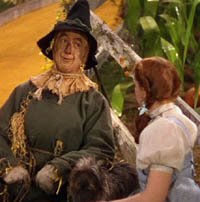Sunday, July 16, 2006
Science Evolves in Kansas

Dorothy actually said "Toto, I've got a feeling we're not in Kansas anymore”, not “We’re not in Kansas anymore, Toto.” It is important to get that right, as Dorothy was carefully stating a hypothesis that could be tested and disproved, a theory, not a fact. The fairy under the house and the immediate arrival of the good fairy were supportive evidence, but not proof. There could be fairies in Kansas. Still, a lot of people feel she was a bit too tenative.
In a democracy, these things are determined by majority rule, most commonly through our elected officials, and it has been established as a matter of fact that at that point Dorothy (and Toto) were not in Kansas. Even people who have not seen the movie are convinced. It is pretty much the same with evolution. Those voting for it feel it’s a theory, while those voting against it feel it’s a theory, while their own contrary view is an absolute fact. In those situations, the swing voters tend to go for certainty. This led the Kansas State Board of Education to revise the state’s science standards to include criticism of evolution. Given how humans have turned out, that is certainly a reasonable view.
While the Board was at it, they also revised the official definition of science, removing the words “natural explanations” from the old definition, which decreed “Science is the human activity of seeking natural explanations for what we observe in the world around us”. The old one wasn’t the greatest, but at least it wasn’t intimidating to the average high school student. The new definition has a bunch of stuff about hypothesis testing and experimentation, thus is more intimidating, but at least it leaves it open for the student who already knows the reason for everything to avoid a bunch of uncertainty. This is why we prefer to rely on elected politicians for this sort of thing. If you left it to most scientists, you would end up with some proposition like "a law of science can never be proved, it can only be used to make predictions that can be tested, and possibly proved wrong". Who wants to learn something that changes later?
Our old friend Galileo maintained that there were two equally valid ways to understand the divine, one by contemplation of the Bible, His Word, and the other by scientific contemplation of the world, God’s creation. The problem was he never really clarified what he meant by “scientific”.